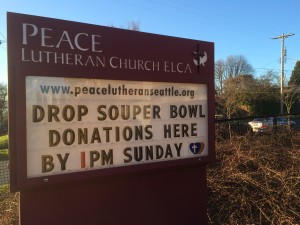In partnership with Earth Ministry, Peace Lutheran Church is hosting a community screening of “The Devil We Know” on JUne 19 @ 7:00pm. This stirring documentary tells the story of 3M and DuPont corporations introducing harmful PFAS chemicals into the environment. PFAS are highly persistent nonstick chemicals, such as Teflon, that are linked to very serious, sometimes lethal, health issues. These toxic chemicals are now commonly found in our households and drinking water, making it a moral issue for the health of our families and all creation. The good news is that Washington State is already a leader in addressing these toxic PFAS chemicals – remember that we banned PFAS from food packaging in 2018! After the screening, representatives from Earth Ministry and Toxic-Free Future will share how you can take action to help Washington continue to lead the phase out of PFAS chemicals. There will also be continued action opportunities later this year. We invite you to join us as we build awareness about the dangers of PFAS through this screening and put faith in action to remove them from our homes and environment.
Archive for the ‘Archive’ Category
UP FOR ARTS, University Place, Washington Presents:
The American Tenor, Jon Lackey & Pianist and International Steinway Artist, James Jelasic
In concert Friday, April 26th, 2019 at 7:00 pm University Place Civic/Library Atrium 3609 Market Place (36th and Bridgeport Way W), University Place, WA
Event Info: (253) 565-8466 Price: $15 adults; $5 students; free for UP for Art members. Tickets at door.
Event Website: www.upforarts.org Sponsored by Symphony Tacoma and Skelley Pianos
We deplore the heinous acts of violence perpetrated against peaceful worshippers at the mosques in Christchurch, New Zealand, and we stand in solidarity with Muslim communities everywhere. God’s will for all humanity is that we walk together the path of peace, nonviolence, and reconciliation.
Education Hour and Worship Services for Sunday, February 10, 2019 are cancelled due to hazardous road conditions.
SOUPer Bowl of Caring – The Super Bowl is just around the corner – February 3. Join our congregation and others from West Seatt le and around the country in raising hunger awareness and funds to support local food banks/meal programs! Please bring a FOOD DONATION ON SOUPER BOWL SUNDAY, February 3rd.
le and around the country in raising hunger awareness and funds to support local food banks/meal programs! Please bring a FOOD DONATION ON SOUPER BOWL SUNDAY, February 3rd.
The HAWKS aren’t in the SUPER BOWL this year, but we can still make a Super-Souper effort to help respond to the need of hungry neighbors.
Food Donations may be dropped off at Peace Lutheran on Sunday, Feb 3 from 8:30am to 1pm. They may also be left at any time under the vestibule by the THISTLE STREET DOORS. Donations support our local food banks!
Sunday, January 27 @ 11:30am is our Annual Congregational Meeting, and you are invited to bring a food dish to share! To help make the day more manageable for families with younger kids there will be no education hour and the worship service will be shortened.
The Church Council has streamlined the agenda, and important decisions will be made.




